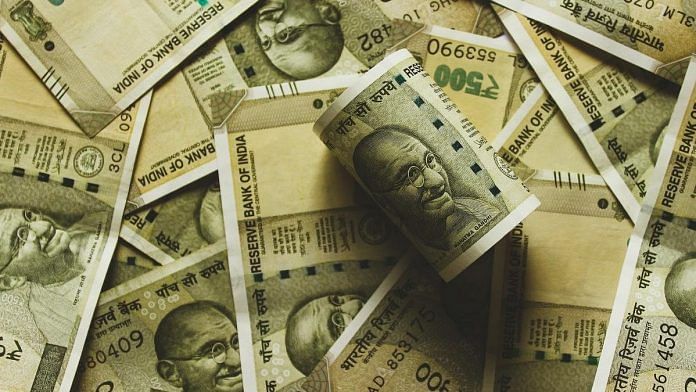New Delhi: The Narendra Modi government has expressed concern over state governments securing loans by mortgaging state assets such as municipal parks, collector’s office, taluk office, courts and hospitals, ThePrint has learnt.
According to the central government, if such loans are secured, they should be clearly disclosed to it under the states’ net borrowing ceiling (NBC) as prescribed by the Centre at the beginning of the current financial year.
Displeasure over the practice was expressed as part of a presentation made by Finance Secretary T.V. Somanathan at the national conclave of chief secretaries of all states in Dharamshala last month. The three-day meeting was also attended by Prime Minister Narendra Modi.
The finance ministry has been highlighting since March how such off-budget borrowings have the effect of bypassing the NBC that the Centre has prescribed for states in a given year. For 2022-23, the central government has fixed a borrowing cap of Rs 8.57 lakh crore or 3.5 per cent of states’ Gross Domestic Product.
Off-budget borrowings are borrowings by state-run entities, special purpose vehicles (SPVs) and equivalent instruments, where the principal and the interest amount have to be serviced from state budgets.
“Such borrowings have an impact on the revenue deficit and fiscal deficit and thus have the effect of surpassing the targets set for fiscal indicators under the state Fiscal Responsibility and Budget Management (FRBM) Act,” the March report of the expenditure department notes.
According to the finance secretary’s presentation, five states — Andhra Pradesh, Uttar Pradesh, Punjab, Madhya Pradesh, and Himachal Pradesh — raised up to Rs 47,316 crore in the two years ending March 2022 through “escrowing of future revenue”. Escrowing means using state assets in the safe custody of a financial institution to secure loans against them.
“Entities that do not have revenue streams to service the loans are getting loans based on state-government guarantees,” a senior government official told ThePrint.
ThePrint reached senior officials in Uttar Pradesh, Himachal Pradesh and Kerala over mail and phone, but did not get a response. However, a senior Punjab government official, who did not want to be named, said these are legacy issues and the AAP government is looking into them.
The data with the Centre, according to the presentation, shows that Telangana, for instance, has outstanding guarantees of Rs 1,35,283 crore, which is around 11 per cent of the state’s projected GDP in 2022-23. Telangana is followed by Sikkim, Andhra Pradesh, Uttar Pradesh, and Rajasthan. “Some states have large outstanding guarantees which pose a threat, if invoked,” it was noted.
The Dharamshala meeting between the Centre and states also raised issues like dues of state power distribution companies to producers, which stood at Rs 1.1 lakh crore at the start of July.
Also read: Caught in a debt trap, Indian states will have to borrow more money to repay loans
State finances in spotlight
The stressed finances of state governments have gained significance since the assembly polls in March this year, when Punjab, for example, promised freebies like 300 units of free power to every household. The scheme has increased the power subsidy burden by Rs 1,800 crore in the current year.
The Reserve Bank of India (RBI) released a paper earlier this year on risk analysis of states’ finances, where it highlighted 10 states whose tax revenues have shrunk in the last five years. Additionally, their debt to Gross State Domestic Product has exceeded the target as prescribed by the 15th Finance Commission.
“The slowdown in own tax revenue, a high share of committed expenditure and rising subsidy burdens have stretched state government finances already exacerbated by Covid-19,” the RBI paper said. “New sources of risks have emerged in the form of rising expenditure on non-merit freebies, expanding contingent liabilities, and the ballooning overdue of discoms.”
States like Andhra Pradesh, Bihar, Rajasthan, Punjab and West Bengal are among those identified as most fiscally vulnerable, and account for around half of the total spending by all states and Union territories, according to the RBI paper.
For these states, the share of revenue expenditure — committed expenditure on salaries, pension and subsidies, among others — in total expenditure varies in the range of 80-90 per cent.
“Some states like Rajasthan, West Bengal, Punjab and Kerala spend around 90 per cent in revenue accounts. This results in poor expenditure quality, as reflected in their high revenue spending to capital outlay ratios,” the RBI paper said.
In a May press release about off-balance-sheet borrowings of states, CRISIL Ratings Director Aditya Jhaver was quoted as saying that “we believe cash-flow support will be required for 50-55 per cent of the outstanding guarantees, and that 4-5 per cent of the annual revenue of states will be consumed for servicing these obligations this fiscal”.
“This is more than double of the mark seen 4-5 years back and hence will partly constrain their flexibility to fund capex in the near future,” he added.
(Edited by Nida Fatima Siddiqui)
Also read: Tame subsidies, hike fees for govt services — Centre’s tips to states to slash deficit



